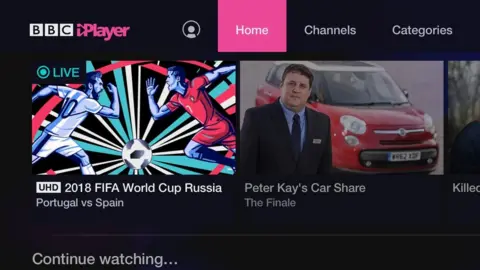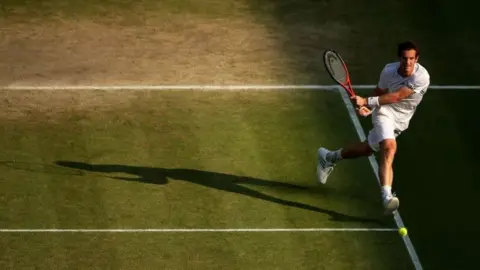Wimbledon tennis to be screened in 4K HDR by BBC
 PA
PAThe Wimbledon Championships tennis tournament is to be streamed in 4K resolution and high dynamic range colour (HDR) to UK viewers by the BBC.
It will follow a current trial in which World Cup football matches are being shown via iPlayer using the next-generation TV technologies.
However, this time the BBC also plans to make select matches available in 4K - but not HDR - to Sky Q customers.
One expert said the tech offered huge benefits but had not been glitch-free.
"The World Cup streams have suffered a few technical teething problems - stuttering and buffering with some devices," said John Archer, a TV reviewer for Forbes and Techradar.
"[There have also been] a few issues with adapting effectively to broadband speeds that are close to the BBC's 40Mbps and 20Mbps streaming quality 'tiers'.
"When the streams have worked well, though, the results have been spectacular."
The reaction on social media has also been largely positive, although some have reported problems.
Allow X content?
Allow X content?
Allow X content?
"The trial has given us valuable feedback allowing us to improve our systems," said a BBC spokesman.
PlayStation Pro
Once again, the BBC intends to offer the trial on a "first-come first-served" basis, saying it will be limited to "tens of thousands of people" to help deal with the extra bandwidth required.
Few, if any, people have found themselves blocked, however, from accessing the ultra-high definition World Cup games.
A list of compatible TVs and set-top boxes is being maintained online. Although it is not mentioned yet, support for the PlayStation Pro was recently added, although it only screens the World Cup games in 4K and not HDR.
The Sky Q coverage will be limited to the men's and ladies' singles semi-final and final matches and will be delivered via satellite rather than the internet.
Users will be given the option to access the Ultra HD feed via a pop-up message.

Brighter, sharper
The term 4K refers to the fact that an image contains four times as many pixels as a 1080p high definition picture.
This can reveal details that would otherwise be difficult to pick out. During Wimbledon, this could potentially make it easier to see whether close-call shots are in or out and help viewers recognise famous faces in the crowd.
HDR takes advantage of the fact modern TVs can go brighter and/or darker than they used to, providing a greater dynamic range. It can help reveal detail in the shadows and prevent highlights from "blowing out".
In addition, HDR adopts a "wider colour space", meaning millions more colours can be displayed if the screen used is classed as "10-bit" or above.
At Wimbledon, late-day games - when shadows can creep across courts creating exposure problems if other parts are still bathed in sunlight - in particular should benefit from HDR's better handling of contrast.
 Getty Images
Getty ImagesFor movies and drama-based TV shows, many experts have judged HDR to offer the greater benefit over 4K.
But Mr Archer said he had found the opposite to be true during the World Cup tests, at least on larger screens.
"Detail and sharpness have been hugely superior to the HD broadcast streams, making the action feel more immediate and much less tiring to watch," he said.
"Being able to see more of the pitch via the 4K camera is also a great feature for serious football fans.
"The use of HDR has been quite subtle by comparison, but has still undoubtedly enhanced the sense of 'being there' that's so important when you're watching sport."
The Wimbledon Championships begin on 2 July.
